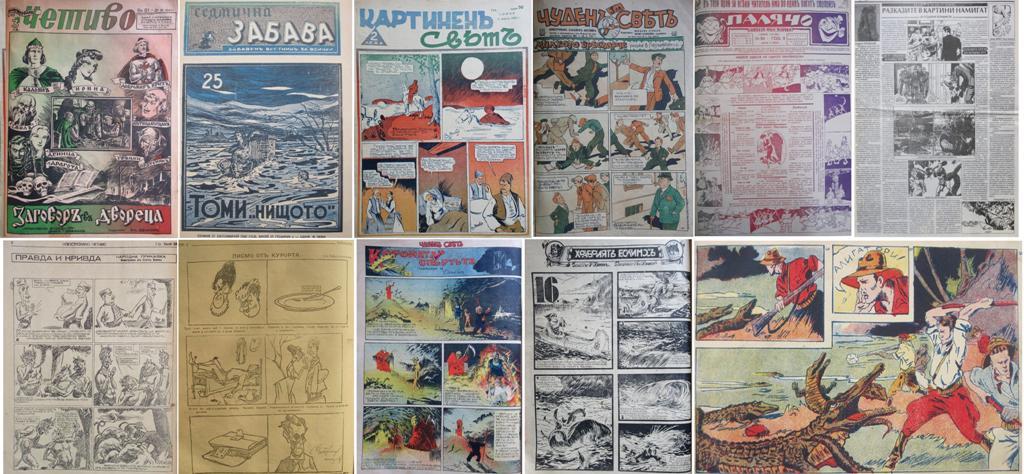Georgi Chepilev: Formation of the Bulgarian Comics Genres in the Period 1890-1980 II
13.06.2022

Първа част: 28 май 2022
The first realistic Bulgarian comics are from the field of history , fairytale and adventure (naive exoticism). The editors do not abandon the narrative form, but as poets seek out subjects that are appropriate for the time. Even today, when we consider Alexander Denkov's "Brave Eskimo", which presents the idea that it is noble to fight for food among the icy wasteland, we reasonably think - how much more important is the issue for people who struggle for food among the abundance.

6. Page from the comic “Hrabriyat eskimos” ("The Brave Eskimo") from the “Chuden svyat” ("The Wonderful World") magazine by Aleksandur Denkov
Socialist comic book
After this golden classic period, an unfortunate episode descended on the Bulgarian comics, interrupting continuity through socialism and turning them into a propaganda educational tool of full state budget support. During totalitarianism, comics were published under strict scrutiny and largely centralized only in the capital. In addition, the availability of documentary materials for research into the history of Bulgarian comics was difficult, and most of the children's comics for ideological reasons were on the banned and burned list. Even today, pre-socialist comics are still difficult to find in Bulgaria. They remained hidden here and there by the predatory eye of enemies and rivals of the comics, the remains of old Bulgarian comics, but during socialism for fear of a concentration camp, they were not mentioned. It is unknown whether today there is a collector in Bulgaria who has full anniversaries of these newspapers. Even libraries do not have some comic books.

7. Adventure novel in pictures from the first years of socialism in Bulgaria, unknown artist
In the early 80's
the Bulgarian comic book awakened from a long slumber and a powerful wave caught the admirers of this art. This happened about a year before the glorious celebrations of the "1300 Years of Bulgaria" (1981), ie. when in the conditions of the Cold War the good face of the system was to be shown, to the socialist camp as an alternative to what was happening in it. However, with the name "Razkazi v kartini" (“Stories in pictures”), the socialist comic books - the "Duga" (“Rainbow”) magazine and the new "Chuden Svyat" referred to the opposite language of the "Novels in pictures" of the Kingdom of Bulgaria. No foreign translated works were published in the "stories in pictures" and thus became a retrospective project, detached from world guidelines.
As for the message, I want to point out that both royal and socialist comics describe and show a model, an ideal of what kind of person they want to shape. They say "through our edition we dream of creating such and such a person." They indicate the program of the publication - what goals they set, where they want to take us, what audience they rely on. Accordingly, the nature of the exhibit changes. Here are two examples:
1. "Chuden Svyat" from the 40's - "Ban Yanuka" reveals a bright page of Bulgarian history, full of courage, valor and patriotism ...;
2. The “Rainbow” Magazine Program Explains - The pages will tell about heroic battles of National Defenders in the distant past, the exploits of guerrillas and jatacs, the masculine combat of brave scouts, the daring conquerors of outer space, the heroism of everyday life of our people, comical stories and characters also won’t be forgotten.
In spite of the dictatorship, most comic book authors were able to unknowingly insert from the censorship elements with a call for freedom, democracy and spiritual perspective, alien to the communist ideological educational agenda. It is necessary to say that in the 1980s, in the socialist Bulgaria, among the youth intellects, there was an interest in spiritual problems, also forbidden by the system. Materialistic propaganda since kindergarten has led every artistic person into despair and many have become alcoholics. The thought that there was nothing in perspective but death led to the emergence of self-published books and the importation of various spiritual teachings, as well as artistic currents beyond the Iron Curtain, including comics.
Thanks to individuals who hold responsible editorial services and sympathizers with endless creative spaces, it became possible in Plovdiv in the mid-1980s to publish about 30 of my (Georgi Chepilev) articles with illustrations protecting comics as art. For the first time in the articles the term comic has been introduced in Bulgaria.


8-9. Georgi Chepilev - articles with illustrations protecting comics as art
After the mid-1980s, the structure for censored antique books was abolished and many of the detained print works were put on sale. Legal collectors also appeared, who began the exchange.
© Диаскоп Комикс - Diaskop Comics

Редакцията на "Диаскоп" изказва благодарност на своите сътрудници, които редовно изпращат информация първо при нас! Редакцията с отговорност оформя материалите и ги публикува. Препоръчваме на всички колеги, които желаят да популяризират информацията и вземат назаем съобщения, да поместват линк към първоизточника.